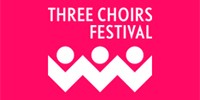
 United Kingdom Three Choirs Festival (14) – Mozart: Emma Johnson (clarinet)*, Alexandra Hutton (soprano), Helen Charlston (mezzo-soprano), Nick Pritchard (tenor), John Savournin (bass), Three Cathedral Choirs, Philharmonia Orchestra / Simon Halsey (conductor), Three Choirs Festival, Cathedral, Gloucester, 28.7.2016. (RJ)
United Kingdom Three Choirs Festival (14) – Mozart: Emma Johnson (clarinet)*, Alexandra Hutton (soprano), Helen Charlston (mezzo-soprano), Nick Pritchard (tenor), John Savournin (bass), Three Cathedral Choirs, Philharmonia Orchestra / Simon Halsey (conductor), Three Choirs Festival, Cathedral, Gloucester, 28.7.2016. (RJ)
Mozart: Te Deum K141; Clarinet Concerto in A K622*; Requiem Mass K626 (completed by Süssmayr)
At this choral concert the limelight shone on the professionals – the men and boys of Gloucester, Hereford and Worcester Cathedrals who sing daily services in their respective churches for most of the year. At past Festivals I have attended their performances have tended to be confined to the afternoons, but since their singing is one of the glories of the Three Choirs Festival, I was pleased this year to see them performing in one of the evening concerts alongside other professionals, such as the Philharmonia Orchestra, Emma Johnson and that eminent choral conductor Simon Halsey.
The evening was a celebration of Mozart – very early Mozart and very late. He composed the Te Deum when he was a mere 13, the same age as some of the choristers on the platform. While the music may not have been all that distinctive – he modelled his score on Michael Haydn’s Te Deum – it has its moments. The march-like opening movement with full orchestra and trumpet was a joyous affair. The short Te ergo movement was suitably prayerful and the work ended with a lively, well thought out fugue.
The Clarinet Concerto in A dates from the autumn of 1791 and has become one of the composer’s best loved works. Simon Halsey established the warm genial tone of the work in the opening orchestral passage, and Emma Johnson’s clarinet joined in adding colour and shade to the music. The Adagio was sublime and intimate with a contrasting trio full of delightful trills and runs from the soloist. The vivacious finale was full of good humour and Emma Johnson’s fresh and effortless playing made it quite magical.
In terms of variety and dramatic power this was the best performance of Mozart’s Requiem that I have heard. The heavy tread of the opening was lightened by references to “lux perpetua” and the consoling voice of Alexandra Hutton in “Te decet hymnus”. The opening lines of the Dies irae were taken at a furious pace clearly designed to inspire terror and panic, and John Savournin (bass) emphasised the all-encompassing solemnity of the occasion. Tenor Nick Pritchard piled on the intensity in the passage “Mors stupebit” and was followed by the more measured tones of mezzo soprano Helen Charlston. The choir’s return with “Rex tremendae majestatis” was like an earthquake, and followed by some terrified pleading for salvation. In the “Recordare” it was pleasing to find the members of the vocal quartet so well matched as they submitted their personal pleas and humbly acknowledged their guilt. A more spirited contribution emanated from the choir with reference to the accursed and hell fire but this was soon dissipated to a quiet, gentle pleading for mercy. After so much drama the “Lacrimosa” with its quietly pulsing heartbeat brought the rigours of the Day of Wrath to a poignant close.
There were good contrasts between the choir and soloists in the Offertorium with its stern reminder to God of the promises he had made to Abraham and serene hope shining forth from the Hostas. The Sanctus, which was largely Süssmayr’s work, was majestic yet sincere, and calm was restored in the Benedictus, also composed mainly by Süssmayr. The concluding words of the Requiem in a major key offered a striking contrast with its dark opening and the mighty fugue at the end rounded off the work convincingly.
This was a spell binding performance from Simon Halsey who marshalled his forces with great skill. The wholehearted commitment of singers and musicians made this a heavenly and spiritually uplifting experience.
Roger Jones